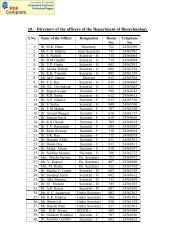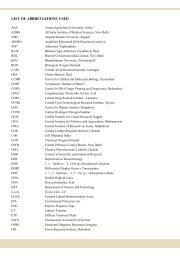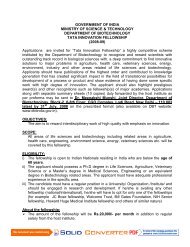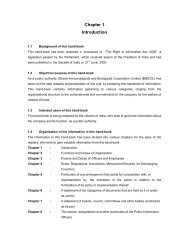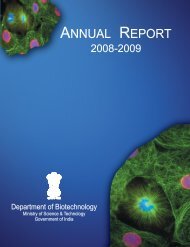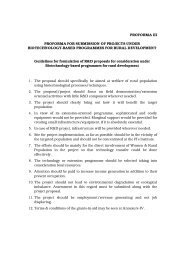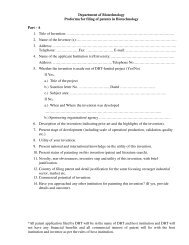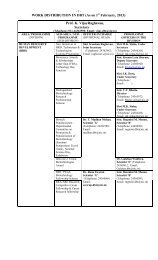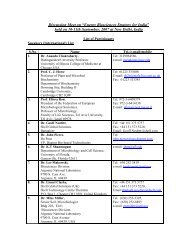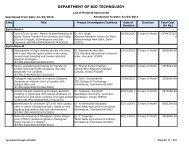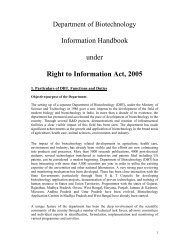ANNUAL REPORT - Department of Biotechnology
ANNUAL REPORT - Department of Biotechnology
ANNUAL REPORT - Department of Biotechnology
You also want an ePaper? Increase the reach of your titles
YUMPU automatically turns print PDFs into web optimized ePapers that Google loves.
source <strong>of</strong> income to surrounding local people. Based<br />
on the standard design practice and laboratory<br />
studies, an effluent treatment plant and a fish pond<br />
were constructed. Experimental protocol was<br />
standardized on fish culture and a low-cost extruder<br />
based fish feed production unit fabricated. Fortified<br />
fish feed pellets with essential minerals and vitamins<br />
have been tested on fish and performance <strong>of</strong><br />
standardized fish feed formulation was studied.<br />
Training programmes on feed preparation was<br />
organized. The demonstration <strong>of</strong> technology was<br />
undertaken for selected youths belonging to SC/ST<br />
weaker sections to train them in wastewater<br />
aquaculture and value addition <strong>of</strong> by-products from a<br />
typical parboil rice mill industry.<br />
Animal Husbandry<br />
Project was undertaken to train farmers on various<br />
aspects <strong>of</strong> brooding, hatching, production and<br />
reproduction using locally available materials in<br />
Mizoram. Quail farming has been popularized<br />
among the tribal community and school children <strong>of</strong><br />
Mizoram, as it is easy for them to rear and earn.<br />
Trained beneficiaries started rearing Quails through<br />
adoption <strong>of</strong> technology packages through erection <strong>of</strong><br />
bamboo housing and maintaining sex ratio. Pig<br />
rearing is also very common in Mizoram and some<br />
farmers are rearing both quails and pig together to<br />
earn extra income.<br />
Organic Farming<br />
Aspects on organic farming through dissemination <strong>of</strong><br />
Quail farming by tribal folk in Mizoram<br />
DBT Annual Report 2006-07<br />
134<br />
know-how for on farm fertility management,<br />
vermiculture and it's enrichment was undertaken in<br />
Rajastan through training programs conducted using<br />
agriculture waste, crop residues & cow dung. Around<br />
6000 farmers were trained on various bio-dynamic<br />
preparations and composting. Linkage established<br />
with the exporters to enable direct market <strong>of</strong> cotton,<br />
banana, turmeric and pulses. Farmers fetches<br />
around 20-25% additional revenue for their organic<br />
certified produce. In Tirupati district <strong>of</strong> Andhra<br />
Pradesh, SHGs formed are creating awareness on<br />
productive use <strong>of</strong> agricultural waste for<br />
vermicomposting and mushroom cultivation and its<br />
advantages in income generation, employment,<br />
enhancing food nutritive value and pollution<br />
abatement. Training programmes on compost<br />
production were undertaken at Kerala benefiting<br />
around 400 farmers. A vermi-mela was organized for<br />
technology dissemination to the farmers at Aligarh for<br />
two days, which was attended by farmers and district<br />
agriculture extension <strong>of</strong>ficials.<br />
Biocontrol Agents<br />
Popularization programme on use <strong>of</strong> Trichoderma<br />
spp. was undertaken at National Botanical Research<br />
Institute, Lucknow to educate and train farmers using<br />
cheap agricultural wastes. Mass multiplication <strong>of</strong><br />
Trichoderma was undertaken using locally available<br />
raw material, protecting high value crops against<br />
several soil-borne diseases. Packets <strong>of</strong> mother<br />
culture <strong>of</strong> potential strain <strong>of</strong> Trichoderma were<br />
distributed to the farmers along with the extension<br />
material.<br />
Mushroom Cultivation<br />
The activity was promoted as an alternate income<br />
generation source in Tamil Nadu utilizing locally<br />
available agriculture residues, coir pith, mat, banana<br />
dried leaves, handloom waste and paddy straw<br />
available at the villages. Various aspects on<br />
mushroom cultivation such as spawn preparation,<br />
selection <strong>of</strong> raw materials, bed preparation,<br />
harvesting, processing and sale <strong>of</strong> mushroom were<br />
demonstrated. Around 500 beneficiaries were<br />
benefited through cultivation <strong>of</strong> mushrooms, product<br />
preparation, commercialization and marketing etc.<br />
The training programmes on oyster mushroom<br />
cultivation were undertaken for SC/ST and Weaker



